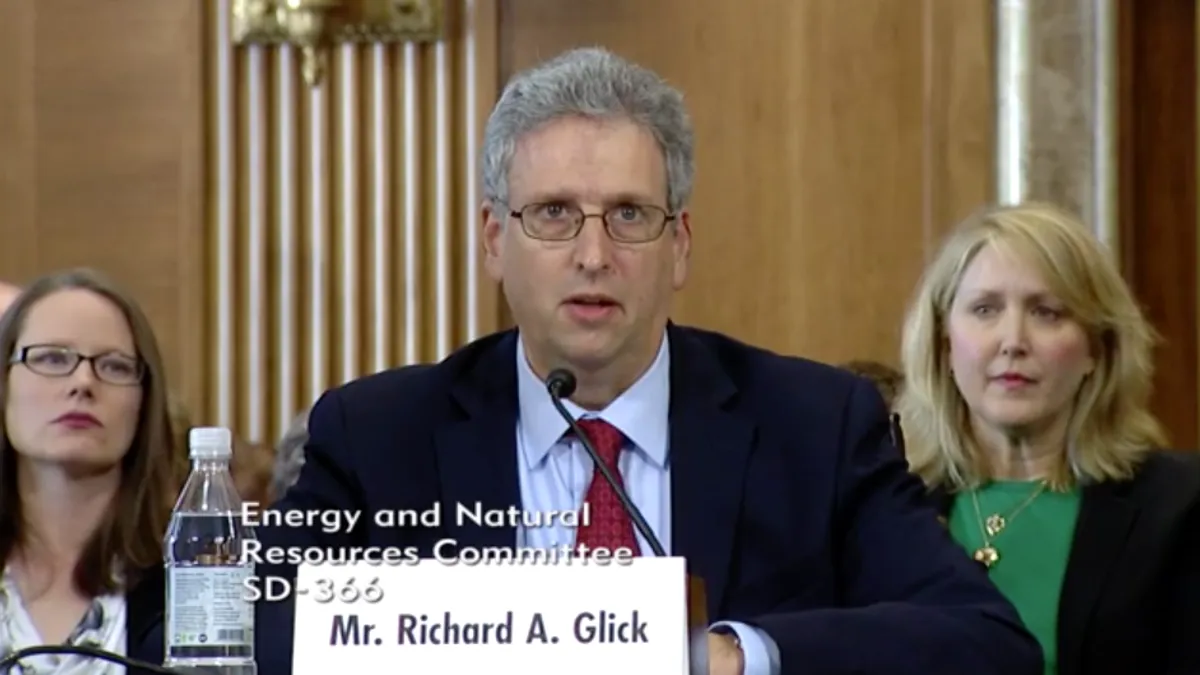Dive Brief:
-
The head of the Federal Energy Regulatory Commission on Thursday pledged to more carefully consider environmental justice, as well as climate change impacts, in assessing gas infrastructure.
-
Chair Richard Glick in a call with reporters echoed previous comments he's made, arguing that FERC does not consider greenhouse gas emissions holistically enough when assessing whether to approve liquified natural gas facilities and gas pipeline projects. He added that he was "heartened" by Commissioner Neil Chatterjee's comments during FERC's January meeting, indicating that he was open to compromising on such issues.
-
At the same time, he made it clear that he was not entirely opposed to new gas infrastructure. "Some people are out there saying, 'Oh, he's against all pipelines,'" he said. "That's simply not true. But I've dissented in many cases because I think the commission hasn't followed what the DC Circuit required us to do."
Dive Insight:
A landmark 2017 U.S. District Court for the D.C. Circuit ruling found that FERC's environmental impact assessment for pipelines was "inadequate" and directed the commission to consider downstream greenhouse gas emissions in considering whether a pipeline is necessary and in the public interest. FERC interpreted the ruling to apply to a limited set of cases, but some critics say that view is too narrow and not what the court intended.
Glick is in this camp, and believes the commission should undergo a more rigorous process when assessing whether to certify gas projects. In considering whether a pipeline is necessary and in the public interest, for example, the commission should determine whether the adverse impacts of that pipeline, including the contributions of greenhouse gases to climate change or whether a facility will harm in some way an environmental justice community, outweigh the necessity of the project.
"There are various ways of doing this. It's not that hard," he said. "But my beef with where the commission has been in the last couple years is that we haven't engaged with that thinking. We've just said, 'We're gonna put the greenhouse gas numbers in the record, but we're going to refuse to consider whether those emissions are significant from a climate change perspective."
The new chairman may have the support he needs on this issue. Chatterjee last week indicated that he'd be willing to come to a "compromise" on how to make "serious, sustainable progress" on issues such as pipeline and LNG certification. Commissioner Allison Clements, who joined the commission in December, has made it clear that climate change will play a role in her decision-making.
An open question is how the commission will address this issue. One option is for the commission to continue its review of a 1999 policy statement that governs how FERC considers gas pipeline certifications. Chairman Kevin McIntyre in 2017 opened up a notice of inquiry (NOI) on that policy, which yielded "a ton" of comments, noted Glick. However, no concrete action came from the proceeding, which is still open.
"Some of the issues that [NOI] raised are still valid issues," said Glick. The commission could also reassess its pipeline and LNG certification process through the rulemaking process, he added.
"How we're going to address it … still needs to be resolved," he said. "I need to work with my colleagues, but I'm definitely committed. And I think they're committed, hopefully, as well, to improving the processes that we use to site these facilities."
Glick's office on Thursday also announced the commission would create a new senior position, intended to coordinate environmental justice and equity concerns into FERC's decision-making process, with details on the role to come.
In the past, they "haven't taken the issue too seriously," but Glick said he is committed to ensuring that FERC more carefully considers equity and environmental justice in siting projects, as well as ensuring community voices are heard.
"In talking to some folks over the last several years, they don't feel like we really care about their plight or care about their conditions," he said. "And one thing I want to make sure is that they understand ... we are going to be taking them seriously and that they're going to have a voice in our particular proceedings."
Glick has also previously pledged to prioritize transmission, lowering barriers to new energy technologies and ensuring wholesale markets do not interfere with state clean energy policies. He said next Thursday's open FERC meeting will reveal more about those priorities and how the commission may address them.














